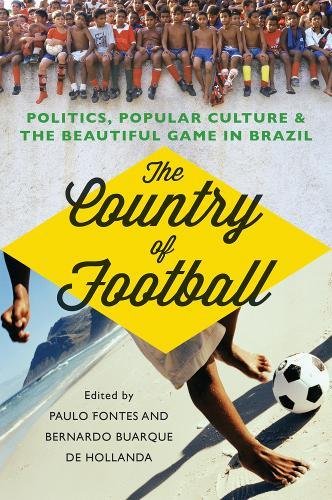- How soccer shapes Brazil and how Brazilians have changed global soccer are the twin themes in this vividly written history.
- Brazil and soccer in the headlines with the World Cup
- Looks at the politics and history of the game and its impact on society

The Country of Football
Politics, Popular Culture, and the Beautiful Game in Brazil
Sinopse
Sumário
Chapter 1
The early days of football in Brazil: British influence and factory clubs in Sao Paulo
Fatima Martin Rodrigues Ferreira Antunes is a sociologist with a Ph.D. received by the Universidade de São Paulo (University of São Paulo/USP). Her thesis was a pioneer study on football factory clubs in the early 20th century. She is currently a researcher at the Departamento do Patrimônio Histórico da Secretaria Municipal de Cultura de São Paulo (Department of Historic Heritage at the Municipal Secretary of Culture from São Paulo city)
Chapter 2
Malandros, ‘Honorable Workers’ and the Professionalization of Brazilian Football, 1932-1942,
Gregory E. Jackson, Jr., recently received his Ph.D. in Latin American History from Stony Brook University, with a special focus on the relationships between sport and social categories such as race, ethnicity, gender and national identity in modern Brazil. He is currently a lecturer at Western Connecticut State University.
Chapter 3
Football in the Rio Grande do Sul Coal Mines
Marta Cioccari is an anthropologist, with a Ph.D. from Museu Nacional (National Museum), Universidade Federal do Rio de Janeiro (UFRJ). She studied rural and urban workers from the South of Brazil. As ethnographer, she is interested in the formation of the working-classes values, such as honour and reputation. Her studies are also related to the military regime in Brazil, particularly social memory, biographies and trajectories.
Chapter 4
Futebol de Várzea and the working-class: amateur football clubs in São Paulo (1940s-1960s)
Paulo Fontes is an Associate Professor at the Fundação Getulio Vargas (CPDOC/FGV) and a Researcher of the Brazilian Scientific Research Council (CNPq). A historian of Brazilian labour and working-class culture in São Paulo after the World War II, Fontes has studied the internal migration from the Northeast to São Paulo, the links between rural and urban workers, the role of place and communities in working-class formation, and the cultural aspects of popular organization and politics.
Chapter 5
José Sergio Leite Lopes is a full professor of Social Anthropology at the Universidade Federal do Rio de Janeiro (Federal University of Rio de Janeiro/UFRJ). He has been investigating for more than thirty years working-class cultures, including sports, in Brazil and is the author of many articles and book on these topics.
Chapter 6
Football as a profession: origins, social ascension and the work world of Brazilian footballers (1950s-1980s)
Clément Astruc is a French historian, with a master’s degree at the École Normal Supérieure, in Lyon. During 2012 and 2013, he received a scholarship from the Embassy of France in Brazil due to research the development of the professional Brazilian football.
Chapter 7
Dictatorship, re-democratization and Brazilian football in the 1970s and 1980s
José Paulo Florenzano is an anthropologist, with a Ph.D. received from Pontifícia Universidade Católica de São Paulo (Pontifical Catholic University /PUC-SP). He is professor and researcher of the Social Science Department at the same institution. He is interested in the study of the professional football during the military regime in Brazil (1964-1984).
Chapter 8
Public power, the nation and stadium policy in Brazil: construction and reconstruction of Maracanã for the World Cups of 1950 and 2014
Bernardo Buarque de Hollanda is an Associate Professor at the School of Social Sciences of the Fundação Getúlio Vargas and a researcher at the Center for Research and Documentation of Brazilian Contemporary History (CPDOC/FGV). His main topics of research are: literary history and modernism; social thought and intellectuals in Brazil; social history of football and organized soccer supporting groups.
Chapter 9
From culture to spectacle, the new logics of Brazilian football
Christopher Gaffney is a geographer, with a Ph.D. from University of Texas. He has experience in Urban Planning area, with emphasys in sports mega-events, particularly football stadiums. He received Fullbright fellowship from the North American government, in order to develop a research in Rio de Janeiro. Since 2011, he is visiting professor at Universidade Federal Fluminense (Fluminense Federal University/UFF), in the same city.






